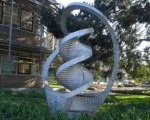Using DNA to identify plants
Sophie Leguil
- Region:
- Anywhere
- Notice Period:
- Emergency (maybe less than one week's notice)
- Type:
- Professional
- Fee:
- Paid: £80 + travel (contact me to discuss this)
- Category:
- Hobbies
- Updated:
- 12th September 2019
We know that new plants are discovered every year, and that many plants have their name changed after "DNA studies". But how does it all work? In this talk, I go back to the basics of DNA, life's building blocks, and explain in simple terms how DNA can be used to identify and compare plants.
Views: 1441 | Enquiries: 1About Sophie Leguil
---ONLINE TALKS mainly---
Trained as a botanist & ecologist, I am fascinated by the natural world in all its forms. I have previously worked in a botanical garden, and in a national charity conserving the wonderful diversity of cultivated plants in the UK, from rare vegetable varieties to 18th century carnations.
I now work freelance as horticultural advisor, ecological surveyor, botanical tour leader (Europe and Asia) and writer.
I have given talks to a wide range of audiences, from gardening clubs, professional landscapers, to MSc students or government staff. I am always happy to adapt the length and the content of my talks to your needs.
As I have moved to France, I mainly give online talks (Zoom, Google, Teams...) though please feel free to contact me if you'd like to discuss about an in-person talk in the UK.
Other Talks on SpeakerNet by Sophie Leguil
- Plant hunting in the 21st century
- Variegated plants: biological curiosities for garden interest
- The fascinating world of pollens
- Plant names keep changing – what should we do with taxonomists?
- Insects in the garden: friends or foes
- The Tien Shan mountains of Southern Kazakhstan and their alpine flora
Send a message to the speaker
If you are interested in this talk and wish to contact the speaker, please complete the following form:

